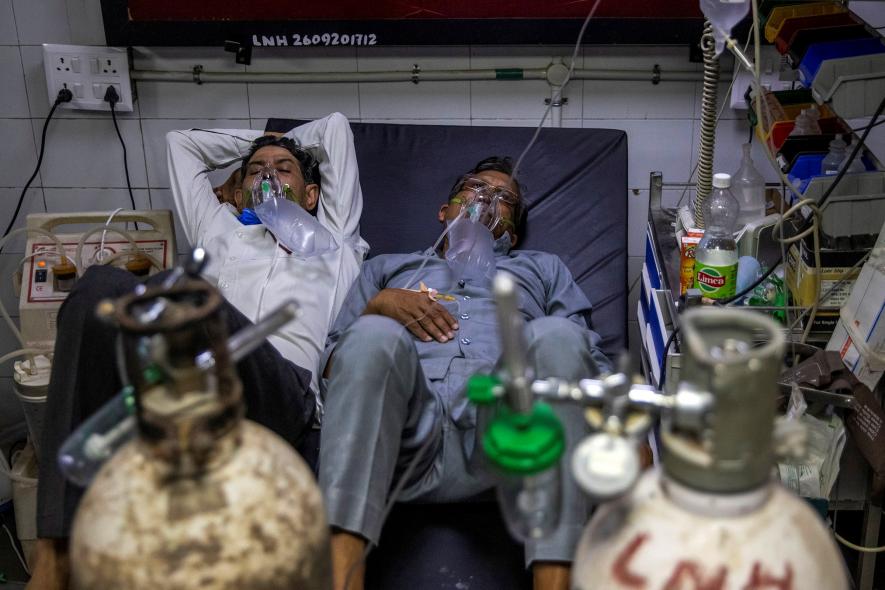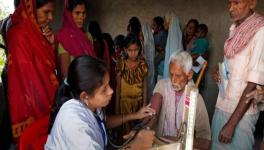The Real ‘System’ Behind India’s COVID-19 Crisis: Capitalism

Image Courtesy: Reuters
Just a few days ago the Indian media came up with a new word, ‘system’, and laid the entire blame on this non-entity for the plight of Indians battling the COVID-19 pandemic. Feisty liberals responded with ‘Modi hi system hai’ (Modi is the system), Hindutva zealots responded, although a bit muted this time, ‘sattar saal se kya kiya?’ (what did you do for the past 70 years?).
The seemingly neutral ‘system’ was cleverly employed as a safety valve by the private media channels to safeguard the ruling government from ruthless criticisms and provide a patina of legitimacy to it when it has lost all the moral grounds to hold the reins of power. The mode of virtual opposition was also blocked by Facebook when it rolled back #ResignModi from trending in India.
The euphemism ‘system’, in reality, is neither Narendra Modi nor the Bharatiya Janata Party, but capitalism. Although the ruling government has been exceptionally kind to the representatives of the system—the capitalists—by launching India’s biggest ever public assets sale that is to the tune of Rs 2 lakh crore, along with a historic corporate tax cut leading to a loss of Rs. 1.5 lakh crore annually in direct taxation and benefiting the top 1%. This amount would have been enough to vaccinate (at the central government’s rate of Rs. 150) all Indians free of cost over six times!
Capitalism is a spontaneous system marked by the division of society into two great classes—the bourgeoisie and the proletariat. The former live off the latter’s work whereas the latter have nothing to live off but through the sale of their labour power. Historically speaking, this is the first system in the history of mankind wherein the largest chunk of mankind, the workers, become completely bereft of all property to sustain themselves over and above their wages. Without the fulfilment of this condition, capitalism cannot work since its sole aim is to put on sale all the services and needs of mankind on the market. This includes health, education, and lately, even death, since private companies have sprung up to offer bespoke and ‘theme-based’ funeral services in memory of the departed!
Also read: COVID Horror: Criminal Dereliction of Duty While Indians Gasp for Breath
With the capitalist system in place, a global pandemic is nothing but an opportunity for the capitalists to mooch off profits when the common people lay dying on the streets. Big pharma companies have already started lobbying intensely to stop the abolition of vaccine patents and those countries which have private vaccine-making companies, are the ready made victims of their profit motive.
Each day Indian pharmaceutical companies are coming up with jacked-up rates, grinning at the helpless dependency of the common people on them, and making the best out of the worst pandemic to hit mankind over a century. Scions of pharmaceutical companies are not afraid to splash money in a super-luxurious lifestyle.
A month ago, Adar Poonawalla, the owner of Serum Institute India, has rented out a property in Mayfair, London for $ 69,000 (Rs 51 lakh) per week from a Polish billionaire. The deal is record-breaking even for London standards and the mansion is one of the largest residences measuring 25,000 sq. feet, equivalent of 24 average-sized British homes! Whereas those to whom he sells his products and qualify as his fellow Indians are scrambling for hospital beds, oxygen, and most, unfortunately, crematoriums.
On April 29, Poonawalla’s life was deemed by the government to be extra-precious. He has been accorded ‘Y’ category security by the Government of India. Contrast this with people begging and being beaten by policemen for demanding oxygen cylinders for their mortally sick relatives. The Uttar Pradesh government has crossed all limits and decreed for the seizure of the property of those who would dare to complain against the broken public health care infrastructure of the state.
Similar is the sheer insensitivity of the cash-rich and profit-seeking Indian Premier League. Host to the money of India’s biggest capitalists, it is providing entertainment when it is least required. And the most depressing thing to emerge is that out of the five conscientious players leaving the IPL, only one is an Indian.
Defending the continuation of the league, an official of the Board of Control for Cricket in India (BCCI), by far the richest cricket board in the world with a net worth of Rs 2,184 crore, which is almost four times that of the second richest cricket board, has said, ‘‘IPL provides a much-needed distraction for all from the doom and gloom around us.’’ In this innocuous statement lies the core meaning of capitalism. Sheer insensitivity towards human loss of lives along with a profit motive which must be protected at all costs since Rs 4,000-5,000 crore are on the line in terms of advertisement and sponsorship money.
Also read: COVID-19: Responsibility for ‘Catastrophe’ Lies With PM Modi and his Govt, Say Left Parties
Globally speaking, the priorities of the capitalist system are clear even in its biggest fortress—the United States of America. Last year, the Federal Reserve took over the bailout program and leveraged the US Congress’s original allocation by a factor of 10—from $ 454 billion to roughly $ 4.54 trillion—for ‘loans, loan guarantees, and other investments.’ Some $ 4.586 trillion, roughly 75% of the total $ 6.286 trillion derived directly from the public tax-funded CARES Act money went into the ‘care’ of the country’s biggest and best-off companies.
By contrast, as unemployment soared, just $ 603 billion were allocated for direct cash payment to families and individuals, $ 260 billion for unemployment insurance, and just $ 43 billion for student loans. President Biden, a long-time spokesman of big capital, is still reluctant to sign the single-payer medical insurance bill. Despite the losses that the common American has incurred due to the pandemic, he is still mulling over a ‘Medicare-like option that would serve as a transitional legislation and pave the path to a Medicare-for-All single-payer system in the future’. In reality, this half-hearted legislation would pave the way for a return to the status quo once the pandemic has subsided and lobbying by insurance companies resumes afresh.
In such richer nations where the state stepped in with subsidies (global stimulus stands at $ 16 trillion), it is the poor who would have to ultimately pay for them through austerity measures and welfare cuts. According to an Oxfam report, out of the 91 loans sanctioned by the International Monetary Fund (IMF) during the pandemic, 76 of them demanded austerity measures such as public sector cuts, wage control, and end of healthcare subsidies.
The much-touted growth of the private health care sector in India, too, has failed to deliver. Its failure has been in the making precisely because it is only geared towards profit and has no long-term concern for public health, not to speak of a global pandemic. India’s spending of its gross GDP on public healthcare is 1% and this proportion has fallen from 1.3% of GDP in 1991 when the neo-liberal reforms were inaugurated. The lack of solid public health care thereof has led up to 80% of urban and 85.9% of rural India being left without any health coverage.
Ordinary Indians crumbled underneath the weight of this broken structure when the pandemic hit with full force. They were forced to seek treatment at private hospitals at ruthlessly exorbitant rates. On the average, primary treatment of a COVID-19 patient oscillates anywhere between Rs 20,000-30,000 a day (without ventilation support). And this is when the per capita net national income (NNI) is Rs 1,26,000. In other words, a 14-day stay in a private hospital can rob the common Indian of his annual of income and leave him with piles of debt.
Dependency on private hospitals is inevitable because India has a total of 43,486 private hospitals, 1.8 million beds, 59,264 ICUs, and 29,631 ventilators, whereas there exists only 25,778 public hospitals, 713,986 beds, 35,700 ICUs and 17,850 ventilators (these estimates are based on 2020 estimates). All in all, 62% of India’s health infrastructure is in private hands, and their owners are making a fortune.
Also read: Will Failure to Handle Pandemic Prove a Tipping Point for Modi Regime?
Neither the state governments nor the central government is planning to take over private hospitals given the unprecedented health crisis and stop the massive flow of public money into private coffers. Some states such as Chattisgarh ordered a complete takeover but withdrew the decision within a day. Last year, Spain nationalised all the private health care units when the total number of active COVID-19 cases were less than 10,000.
COVID-19 has caught capitalism with its pants down and in India, even the torso is exposed. The latent class divide has sharpened to such an extent that if progressive forces decide to forge a sword out of it, huge damages could be inflicted upon this ruthless and heartless system of oppression.
If not anything else, the talk of universal health care should be brought to the table. The government should be forced to enact a national health care scheme on the lines of the British one. The latter came as the result of the post-war convulsions experienced by Britain. The Labour leader and Minister of Health, Aneurin Bevan, supported by the British working class, launched the National Health Service (NHS) wherein the government took over responsibility for all medical services which included free diagnosis and treatment for all Britons.
Unfortunately, India’s Health Minister is no Bevan, and BJP is not the party of the working poor. It will never pass such a law. After the pandemic subsides, it will go back to its usual business of supporting big capital and divide the people on religious lines. This could be halted if the people of India come together and demand radical changes. Only then the ‘system’ could be hurt.
(The author is a research scholar with the Department of World History, University of Cambridge. The views are personal.)
Get the latest reports & analysis with people's perspective on Protests, movements & deep analytical videos, discussions of the current affairs in your Telegram app. Subscribe to NewsClick's Telegram channel & get Real-Time updates on stories, as they get published on our website.
























